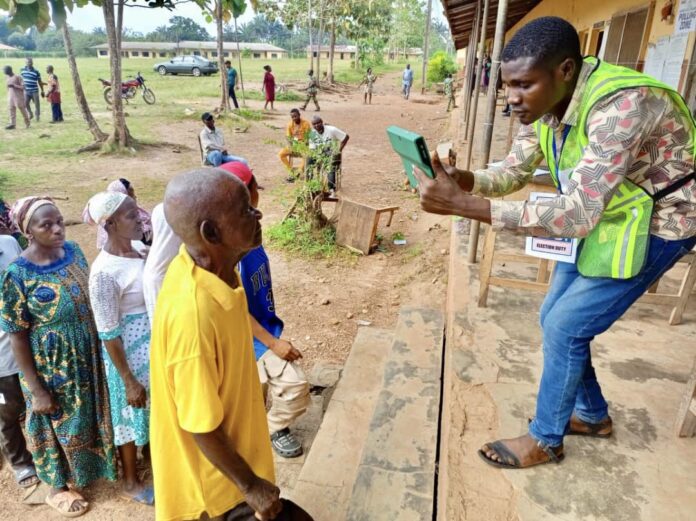In a bold move that has sent shockwaves through the political landscape, the Independent National Electoral Commission (INEC) has rejected the ₦40 billion earmarked for its operations in the 2025 budget. The rejection came during a crucial budget defence session before the National Assembly, where INEC Chairman, Prof Mahmood Yakubu, delivered a forceful message that the proposed allocation is grossly inadequate for the upcoming elections.
While addressing the Joint Committee on INEC and Electoral Matters at the National Assembly on Friday, Prof Yakubu did not mince words. “The ₦40 billion allocated for INEC in the 2025 budget will not even cover a third of our projected expenses,” he stated, painting a grim picture for the future of Nigeria’s electoral process. The INEC Chairman made it clear that the electoral body’s budget proposal for 2025 should total over ₦126 billion to ensure the successful conduct of the elections.
“We are not only looking at the costs for the general elections, but also for off-cycle elections and by-elections, including the upcoming Anambra governorship race and various constituencies,” Yakubu explained. He stressed that the increased cost of conducting elections has become a heavy burden on the Commission, making the ₦40 billion allocation utterly insufficient.
The Joint Committee, chaired by Senator Sarafadeen Alli (APC, Oyo South), was tasked with evaluating INEC’s budget proposal for the 2025 fiscal year. However, what began as a routine session quickly turned into a tense exchange as the Commission expressed deep concern over the financial constraints it faces.
“Aside from the minimum wage adjustments, which have significantly increased personnel costs, we are also looking at substantial spending for logistics, security, and the hiring of temporary staff for various election duties,” Yakubu continued. He added that the inflationary pressures in the economy have further compounded the financial demands of running a credible election, making the original ₦40 billion allocation “unrealistic.”
INEC’s budget woes are not a new development. For the past several years, the Commission has struggled with underfunding, often having to rely on intervention funds to cover shortfalls in its operational costs. Yakubu pointed to previous instances where the Commission had to seek emergency funds, including ₦10.5 billion for Edo and Ondo elections in 2024, and ₦500 million for by-elections in various constituencies. The Chairman made it clear that such interventions were mere stopgap measures, underscoring the urgent need for a substantial and predictable budget allocation.
“In the last election cycle, we were forced to seek additional funding to manage the off-cycle elections. These interventions were crucial but not sustainable. We need proper funding, so we do not find ourselves in the same position again,” Yakubu told the lawmakers. He warned that without adequate financial backing, the Commission could face challenges in delivering a free, fair, and credible election process in 2025.
The ₦126 billion that INEC is requesting includes provisions for election technology, voter education, the training of electoral officers, and the procurement of election materials. Yakubu emphasized that these are not discretionary expenditures but constitutional responsibilities that INEC is bound to fulfill. “We are not asking for the funds to pursue any extraneous activities; we are asking for what is required to uphold the integrity of our elections, which is a constitutional duty,” he argued.
Yakubu’s remarks have stirred concerns about the preparedness of the electoral body for the 2025 elections. With the Commission now formally requesting more than triple the initial budget allocation, questions have been raised about whether the National Assembly will support INEC’s demands.
Members of the Joint Committee responded to INEC’s concerns with assurances that the proposed ₦126 billion would be considered during the budget process. “We understand the challenges faced by INEC, and we are committed to ensuring that the Commission receives the necessary funding,” Senator Alli remarked during the session. Despite these reassurances, there is still significant uncertainty about whether the full requested sum will be approved by the legislature.
The National Assembly, which is currently in the process of reviewing the 2025 budget, faces tough decisions ahead. While some lawmakers agree with INEC’s assessment of the situation, others have expressed concerns about the impact of such a large budget increase on the overall national budget. The final decision will rest with the legislators, who must balance INEC’s financial needs with other national priorities.
The rejection of the ₦40 billion proposal and the request for ₦126 billion comes at a critical time for Nigeria’s electoral system. The 2025 elections are seen as a major test for the country’s democratic institutions, especially after the challenges faced during previous elections, including issues of electoral fraud, violence, and voter disenfranchisement.
Public opinion has been sharply divided on whether INEC should receive the requested funds. Some critics argue that the Commission should demonstrate better financial management and accountability before being granted such a large sum. Others, however, believe that ensuring proper funding for INEC is critical to preserving the integrity of the country’s democratic process.
“Inadequate funding for INEC could set the stage for election malpractices and undermine the trust of Nigerians in the electoral system,” warned political analyst, Dr. Ngozi Ige. “Given the scale of the 2025 elections and the need for reforms, any attempt to shortchange INEC could have serious consequences for the credibility of the elections.”
For now, INEC and the National Assembly will continue to negotiate the details of the 2025 electoral budget. However, one thing remains clear: without adequate funding, Nigeria’s journey towards free and fair elections in 2025 could face major obstacles. The eyes of the nation will be on both INEC and lawmakers as they work to resolve this critical issue in the coming months.

